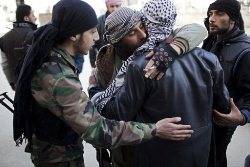Syrian government forces have launched military assaults in different parts of the country, activists said, as Russia said Damascus was making "a lot of mistakes" in handling the unrest sweeping the country.
Revolution activists on Wednesday said two large suburbs of Damascus have come under heavy tank bombardment following renewed attacks by revolution fighters on forces loyal to President Bashar al-Assad.
Artillery and anti-aircraft gun barrages hit the suburbs of Harasta and Irbin, retaken from revolution forces by Assad's forces two months ago, and army helicopters were heard flying over the area, on the eastern edge of the capital, the activists said.
Elsewhere, revolution fighters were forced to pull out from the eastern Syrian city of Deir al-Zor in the face of a fierce army assault.
"Tanks entered residential neighborhoods, especially in southeastern areas of Deir al-Zor. The Free Syrian Army pulled out to avoid a civilian massacre," a statement by the Deir al-Zor Revolution Committees Union said on Tuesday.
Activist Osama Mansour said the fighters lacked guns and ammunition.
"They knew they could not hold control of the neighborhoods, so they decided to stop fighting, knowing that the regime would bring in heavy weapons and kill many civilians,'' Mansour said.
The lightly-armed Free Syrian Army has been forced into retreat across the country in recent weeks, with the army using heavy armor to chase them from towns and cities.
Diplomatic setback
But as Assad made advances on the ground, he appeared to suffer a setback on the diplomatic front, with key-ally Moscow adopting a new, sharper tone after months of publicly standing by his government.
"We believe the Syrian leadership reacted wrongly to the first appearance of peaceful protests and ... is making very many mistakes," Sergei Lavrov, the Russian foreign minister, told local radio station Kommersant-FM.
"This, unfortunately, has in many ways led the conflict to reach such a severe stage."
Lavrov also spoke of a "future transition" period for Syria but continued to reject calls from most Western and Arab states for Assad to resign, saying this was "unrealistic".
It was not immediately clear if the change in language would translate into a tangible difference in the way the divided international community might deal with the crisis.
In a bid to win Russian and Chinese support, France has watered down a proposed UN Security Council statement calling on the Syrian government and the opposition to immediately implement proposals by international envoy Kofi Annan to end the year-long bloodshed.
The original draft presidential statement would have called on the council to review implementation of Annan's six-point proposal in seven days and consider "further measures'' - which could include sanctions or military action - if there was not sufficient progress.
However, a revised draft circulated late on Tuesday and obtained by the Associated Press news agency drops this threat and instead asks Annan to update the council regularly on the progress of his mission.
The uprising against Assad started in March 2011. His security forces quickly cracked down on dissent, attacking protesters with tanks, snipers and pro-regime thugs.
The UN says more than 8,000 people have been killed, many of them unarmed protesters.
The conflict has grown more militarized as many in the opposition have taken up arms to protect their towns and attack regime forces.
PHOTO CAPTION
Free Syrian Army fighters console a comrade after an ambulance carried an injured friend to a hospital during fierce fighting against government troops in Idlib, north Syria, Saturday, March 10, 2012.
Source: Aljazeera.net


 Home
Home Discover Islam
Discover Islam Quran Recitations
Quran Recitations Lectures
Lectures
 Fatwa
Fatwa Articles
Articles Fiqh
Fiqh E-Books
E-Books Boys & Girls
Boys & Girls  Hajj Rulings
Hajj Rulings Hajj Fatwas
Hajj Fatwas














